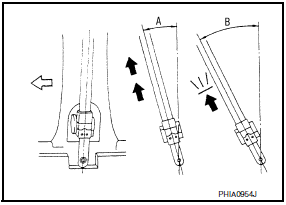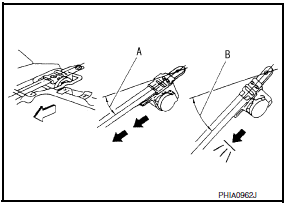Nissan Maxima Service and Repair Manual: Basic inspection
COMPONENT INSPECTION
Inspection
AFTER A COLLISION
WARNING: Inspect all seat belt assemblies including retractors and attaching hardware after any collision.
NISSAN/INFINITI recommends that all seat belt assemblies in use during a collision be replaced unless the collision was minor and the belts show no damage and continue to operate properly. Failure to do so could result in serious personal injury in an accident. Seat belt assemblies not in use during a collision should also be replaced if either damage or improper operation is noted. Seat belt pretensioners should be replaced even if the seat belts are not in use during a frontal collision in which the air bags are deployed.
Replace any seat belt assembly (including anchor bolts) if:
- The seat belt was in use at the time of a collision (except for minor collisions and the belts, retractors and buckles show no damage and continue to operate properly).
- The seat belt was damaged in an accident (i.e., torn webbing, bent retractor or guide, etc.).
- The seat belt attaching point was damaged in an accident. Inspect the seat belt attaching area for damage or distortion and repair as necessary before installing a new seat belt assembly.
- Anchor bolts are deformed or worn out.
- The seat belt pre-tensioners should be replaced even if the seat belts are not in use during the collision in which the air bags are deployed.
PRELIMINARY CHECKS
- Check the seat belt warning lamp/chime for proper operation as follows:
- Switch ignition ON. The seat belt warning lamp should illuminate. Also, the seat belt warning chime should sound for about six seconds.
- Fasten driver's seat belt. The seat belt warning lamp should go out and the chime (if sounding) should stop.
- If the air bag warning lamp is blinking, conduct self-diagnosis
using CONSULT, and air bag warning lamp.
Refer to SRC-12, "SRS Operation Check".
- Check that the seat belt retractor, seat belt anchor and buckle bolts are securely attached.
- Check the shoulder seat belt guide and shoulder belt height adjuster for front seats. Make sure guide swivels freely and that webbing lays flat and does not bind in guide. Make sure height adjuster operates properly and holds securely.
- Check retractor operation:
- Fully extend the seat belt webbing and check for twists, tears or other damage.
- Allow the seat belt to retract. Make sure that webbing returns smoothly and completely into the retractor. If the seat belt does not return smoothly, wipe the inside of the loops with a clean paper cloth. Dirt built up in the loops of the upper anchors can cause the seat belts to retract slowly.
- Fasten the seat belt. Check that the seat belt returns smoothly and completely to the retractor. If the webbing does not return smoothly, the cause may be an accumulation of dust or dirt. Use the "SEAT BELT TAPE SET" and perform the following steps.
- Pull the seat belt out to a length of 500 mm (19.69 in) or more.
- Use a clip or other device to hold the seat belt at the center pillar webbing opening.
- Pass a thin wire through the through-anchor webbing opening. Hold both ends of the wire and pull it taut while moving it up and down several times along the webbing opening surface to remove any matter stuck there.
- Any dirt that cannot be removed with the wire can be removed by cleaning the opening with a clean cloth.
- Apply tape at the point where the webbing contacts the
through-anchor webbing opening.
NOTE: Apply the tape so that there is no looseness or wrinkling.
- . Remove the clip holding the seat belt and check that the webbing returns smoothly.
- Repeat steps above as necessary to check the other seat belts.
SEAT BELT RETRACTOR ON-VEHICLE CHECK
Emergency Locking Retractors (ELR) and Automatic Locking Retractors (ALR)
NOTE: All seat belt retractors are of the Emergency Locking Retractors (ELR) type. In an emergency (sudden stop) the retractor will lock and prevent the webbing from extending any further. All 3-point type seat belt retractors except the driver's seat belt also have an Automatic Locking Retractors (ALR) mode. The ALR mode (also called child restraint mode) is used when installing child seats. The ALR mode is activated when the seat belt is fully extended. When the webbing is then retracted partially, the ALR mode automatically locks the seat belt in a specific position so the webbing cannot be extended any further. To cancel the ALR mode, allow the seat belt to fully wind back into the retractor.
Check the seat belt retractors using the following test(s) to determine if a retractor assembly is operating properly.
ELR Function Stationary Check
Grasp the shoulder webbing and pull forward quickly. The retractor should lock and prevent the belt from extending further.
ALR Function Stationary Check
- Pull out entire length of seat belt from retractor until a click is heard.
- Retract the webbing partially. A clicking noise should be heard as the webbing retracts indicating that the retractor is in the Automatic Locking Retractors (ALR) mode.
- Grasp the seat belt and try to pull out the retractor. The webbing must lock and not extend any further. If NG, replace the retractor assembly.
- Allow the entire length of the webbing to retract to cancel the automatic locking mode.
ELR Function Moving Check
WARNING: Perform the following test in a safe, open area clear of other vehicles and obstructions (for example, a large, empty parking lot). Road surface must be paved and dry. DO NOT perform the following test on wet or gravel roads or on public streets and highways. This could result in an accident and serious personal injury. The driver and passenger must be prepared to brace themselves in the event the retractor does not lock.
- Fasten driver's seat belt. Buckle a passenger into the seat for the belt that is to be tested.
- Proceed to the designated safe area.
- Drive the vehicle at approximately 16 km/h (10 MPH). Notify any
passengers of a pending sudden stop.
The driver and passenger must be prepared to brace themselves in the event the retractor does not lock.
Apply brakes firmly and make a very hard stop.
During stop, seat belts should lock and not be extended. If the seat belt retractor assembly does not lock, perform the retractor off-vehicle check.
SEAT BELT RETRACTOR OFF-VEHICLE CHECK (PILLAR)
- Remove the seat belt retractor.
- Remove the front seat belt assembly, refer to SB-6, "Removal and Installation".
- Slowly pull out webbing while tilting the retractor assembly forward from the mounted position without twisting the retractor assembly as shown in the illustration.

- The webbing can be pulled out if the retractor is tilted 15 degrees or less.
- The webbing cannot be pulled out if the retractor is tilted 35 degrees or more.
- A and B show tilting angles.
 : Front.
: Front.
Replace the seat belt assembly if it does not operate within specifications.
SEAT BELT RETRACTOR OFF-VEHICLE CHECK (REAR PARCEL SHELF)
- Remove the seat belt retractor.
- Remove the rear seat belt assembly, refer to SB-8, "Removal and Installation".
- Slowly pull out webbing while tilting the retractor assembly forward from the mounted position without twisting the retractor assembly as shown in the illustration.

- The webbing can be pulled out if the retractor is tilted 15 degrees or less.
- The webbing cannot be pulled out if the retractor is tilted 35 degrees or more.
- A and B show tilting angles.
 : Front.
: Front.
Replace the seat belt assembly if it does not operate within specifications.
 Precaution
Precaution
Precaution for Supplemental Restraint System (SRS) "AIR BAG" and
"SEAT BELT PRE-TENSIONER"
The Supplemental Restraint System such as "AIR BAG" and "SEAT BELT
PRE-TENSIONER", used along with a fro ...
Other materials:
Illumination control system
System Diagram
System Description
The illumination lamps operation is dependent upon the position of the
lighting switch (combination switch).
When the lighting switch is placed in
the 1ST or 2ND position (or if the auto light system is activated) the BCM
(body control module) receives in ...
Spark Plug
Exploded View
Ignition coil
Spark plug
Rocker cover (RH)
Rocker cover (LH)
Removal and Installation
REMOVAL
Remove the ignition coil. Refer to EM-42, "Removal and
Installation (LH)" and EM-42, "Removal and Installation (RH)".
Remove the spark plug with a suitable spark p ...
P0447 evap canister vent control valve
Description
The EVAP canister vent control valve is located on the EVAP canister
and is used to seal the canister vent.
This solenoid valve responds to signals from the ECM. When the
ECM sends an ON signal, the coil in the solenoid valve is energized.
A plunger will then move to seal ...
Nissan Maxima Owners Manual
- Illustrated table of contents
- Safety-Seats, seat belts and supplemental restraint system
- Instruments and controls
- Pre-driving checks and adjustments
- Monitor, climate, audio, phone and voice recognition systems
- Starting and driving
- In case of emergency
- Appearance and care
- Do-it-yourself
- Maintenance and schedules
- Technical and consumer information
Nissan Maxima Service and Repair Manual
0.0062

